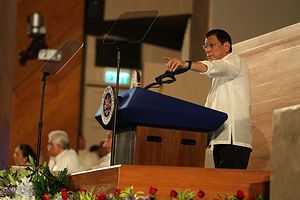Despite the fierce opposition of human rights groups, former Philippine President Ferdinand Marcos was buried at the Libingan ng mga Bayani (Heroes’ Cemetery) on November 18. This triggered widespread protests across the country, with thousands of young people denouncing incumbent President Rodrigo Duterte for endorsing a hero’s burial for the controversial leader.
Marcos ruled the country for two decades before he was ousted by a peaceful uprising in 1986. He was accused of destroying the republic when he declared Martial Law in 1972, which allowed him to rule like a dictator. He died in 1989, but his family wanted to give him a proper burial befitting a former soldier and president at the Heroes’ Cemetery. Succeeding governments have rejected the request of the Marcos family because of security concern that it would spark public outrage.
Fast forward to 2016, and the Marcoses appear to have found an ally in Duterte who won the presidential election held in May. Duterte promised to bury Marcos at the Heroes’ Cemetery as part of his agenda to promote national healing and reconciliation. He insisted, however, that Marcos would not be recognized as a hero but only as a former leader of the country.
Various groups tried to stop the government and the Marcos family. But the Supreme Court ruled early this month that there is no law that prevents the burial of the former president at the Heroes’ Cemetery.
News that Marcos was finally laid to rest in a quiet ceremony at the Heroes’ Cemetery led to spontaneous protests in Manila in just a matter of hours. Massive protests were also organized on November 25 and November 30 in different parts of the country. Among the most active protesters were not only Martial Law victims and their families but also young people who have taken a stand against what they describe as a sinister plot to revise the judgment of history.
They reminded Duterte that Marcos is not worthy to be emulated by the current and next generation of Filipinos. They also insisted that genuine reconciliation cannot take place without serving justice first. And finally, they asserted that burying Marcos as a hero is an insult to all those who sacrificed their lives in the fight for the restoration of Philippine democracy.
Perhaps Duterte and the ruling party have underestimated the lingering anger of many Filipinos against the Marcoses. Perhaps they assumed Filipinos have already learned to forgive because the children and wife of Marcos continue to win in local and national elections.
Duterte gambled his popularity and leadership credibility by choosing to side with the Marcos family. This has disappointed some of his allies, particularly the left, which led some of the anti-Marcos protests in recent weeks. Even some of his cabinet members, several of whom suffered torture during Martial Law, were present in the rallies.
Marcos’ burial also provided political ammunition for Duterte’s critics who are affiliated with the previous administration. The reaction of some administration allies is to accuse these critics of fomenting destabilization. But this only inspired more people to be more aggressive in criticizing Duterte’s friendly ties with the Marcoses.
It doesn’t help that Duterte has been openly praising the leadership style of Marcos. Because of this, his detractors were able to link his controversial “war on drugs” to the Marcos era, when rampant human rights abuses were perpetrated by state forces against the opposition and other critics of the government.
The peaceful staging of anti-Marcos protests could also embolden various groups to be more daring in challenging the rise of drug-related extrajudicial killings under the Duterte government. At a time when Duterte is being pilloried in the international community for his notorious outbursts, can he risk losing the support of more influential voices in the local civil society?
Duterte’s political base remains formidable. But the street protests in the nation’s capital also showed that the “punisher” is unable to deter many people from publicly and strongly expressing their sentiments.
The Marcos burial issue has opened the space for groups that seek to engage the Duterte government on other critical issues such as human rights, foreign policy, peace process, and climate change. Could this lead to bigger protests in the next few months?

































